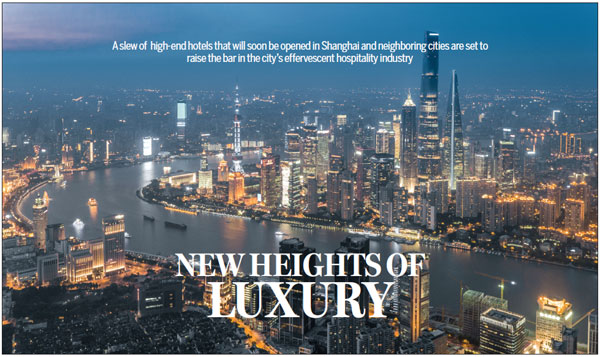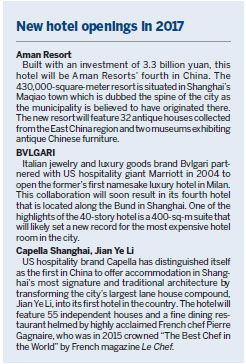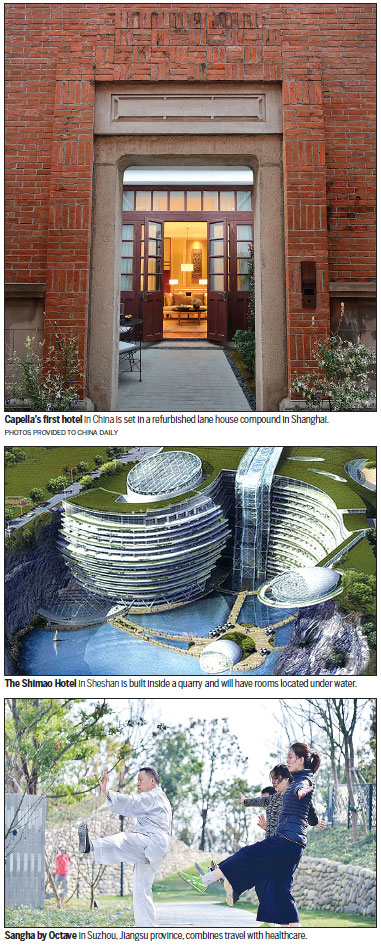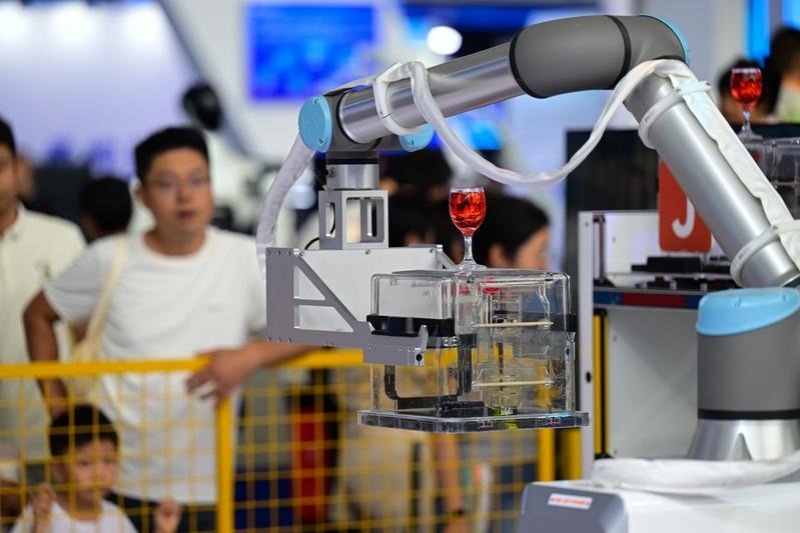New heights of luxury

A slew of high-end hotels that will soon be opened in Shanghai and neighboring cities are set to raise the bar in the city's effervescent hospitality industry
Despite the global economic slowdown, hoteliers have not hesitated to unveil their latest offerings to entice the affluent, with industry experts estimating an addition of 3,000 new luxury hotel rooms to Shanghai between 2016 and 2018.
Many of these rooms will come from Shimao Hotel in Sheshan, the world's one and only quarry hotel that is still under construction, the W Hotel in Shanghai and the ultra-luxury J Hotel in Shanghai Tower by China's State-owned hospitality group Jinjiang International.
The Shanghai Disney resort which opened last June and the National Exhibition and Convention Center will be the two key growth engines for the luxury hotel sector in Shanghai, according to HVS, a global hospitality services provider and consultancy. HVS also said that these two factors will drive occupancy rate in Shanghai's five-star and luxury hotels up by 2.5 to 3.5 percent over the next two to three years.
HVS data also showed that the average occupancy rate of Shanghai's five-star hotels has steadily grown from 59 percent in 2011 to a forecasted 68 percent this year. The average room rate per night in the city during the same period, however, experienced a drop from 1,042 yuan ($151) in 2011 to 907 yuan in 2013. It is expected to rebound to 1086 yuan this year.
A report by real estate consultancy Colliers International pointed out that turmoil in several key international tourist destinations in Europe could also provide a major boost to domestic tourism.
According to the United Nations World Tourism Organization, China has been the world's largest source of outbound travelers since 2012, and it is also likely to surpass the United States and France to become the top tourism destination for international travelers.
Fifteen cities in China now allow 72-hour visa-free entry for nationals of certain countries. Travelers from 51 countries, including the United States, who are visiting Shanghai as well as the neighboring provinces of Jiangsu and Zhejiang can enjoy up to 144 hours of visa-free transit in the Yangtze River Delta.
However, some industry insiders warned that there could be an oversupply of luxury hotel rooms in Shanghai and other first-tiered cities in China.
Jin Jian, a partner at consultancy firm Deloitte China, noted that 50 percent of the four- and five-star hotels in China are looking to be acquired because of poor business performance. He added that the large number of high-end hotels is a result of the bubble in China's real estate market instead of a response to the demands from the travel market.
A recent report by consulting firm McKinsey showed that China's healthcare sector is growing at an astonishing rate, with spending projected to rise from $357 billion in 2011 to $1 trillion in 2020. One of the three growth engines for the industry over the next decade has been identified as the more efficient diagnosis of diseases.
During a visit to the Boao Lecheng International Medical Tourism Pilot Zone in Hainan province in March, Chinese Premier Li Keqiang backed a new business model that combines medical care with travel.
"People's health is the basis for China's long-term development, so a high standard should be set for the medical tourism industry," said Li.
Sangha by Octave, a resort located on an artificial island in the middle of Yangcheng Lake in Suzhou, East China's Jiangsu province, is one example of how travel can be combined with healthcare.
Shipping tycoon Chavalit Frederick Tsao, the founder of Sangha by Octave, is quick to point out that the resort which he spent 3.5 billion yuan to build is nothing like a conventional hotel, saying it is more of a luxurious wellness retreat that is aimed at helping China's affluent enrich themselves spiritually.
"The resort is a well-being platform that fuses Eastern wisdom with Western science. While everything displayed here can be found anywhere else in the world, our combinations are unique and cannot be found outside the property," he said.
"This place is for anyone who finds he has reached the state of material sufficiency but yet feels spiritually impoverished."
The sprawling compound measures 189,000 square meters and boasts a food market backed by as many chefs as nutritionists and a treatment center with state-of-the-art therapies. At the clinic center in the resort, licensed physicians, traditional Chinese medicine doctors and psychologists offer guests holistic treatments aimed at lifting the body, mind and spirit.
At the spa center, Watsu, a type of water therapy from California, is combined with conventional treatments to rejuvenate clients. The first of its kind in Asia, Watsu is a form of aquatic bodywork done by a certified therapist who tries to imitate the movements of an embryo by gently cradling, stretching and massaging the guest who is chest-deep in water heated to 35 degrees Celsius.
Unlike conventional hotels, the resort does not have room rates. Instead, the retreat creates personalized programs based on the health requirements of their guests, with the minimum cost of spending a night being around 9,000 yuan for one person. Standard packages include Chinese Taoist Cleanse, Indian Ayurvedic Cleanse, and Visceral Fat Management.
Tsao, the fourth generation owner of Singapore-headquartered shipping company IMC Pan Asia Alliance, recalled that only ancient Chinese books managed to inspire him when he first tried to learn about business management.
In 1995, Tsao took full control of the family business and transformed the business from a traditional shipping company to a global conglomerate that today boasts diverse business interests. One of these businesses is Octave, the parent company of the resort.
That same year, he founded the East West Cultural Development Center which aims to foster harmony in a rapidly globalized world. It was also in the 1990s that Tsao developed an interest in Taoism and sought spiritual support from the ideology which is believed to be the root of qigong, fengshui and martial arts.
In 2012, he donated 15 million yuan to fund a research center with Tsinghua University in Beijing to focus on sustainability research.
"Traditional Chinese culture is fascinating. All it needs is a modern expression that fits the 21st century," he said.
The flagship business of Octave is a wellness and fitness center that was opened in Shanghai in 2015. The group also owns the Thought for Food restaurant that is focused on wholesome-eating. A similar but smaller retreat by the group is currently under construction in China's Sichuan province. It is expected to open in 2018.
Tsao added that the two retreats, if run successfully, could eventually be introduced globally as a promoter of traditional Chinese culture.
xujunqian@chinadaily.com.cn



(China Daily USA 05/12/2017 page9)
Today's Top News
- Mainland increases entry points for Taiwan compatriots
- China notifies Japan of import ban on aquatic products
- Envoy: Japan not qualified to bid for UN seat
- Deforestation is climate action's blind spot
- Japan unqualified for UN Security Council: Chinese envoy
- China, Germany reach outcomes after discussions






























